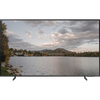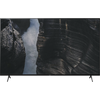A comparison of specs, key information, reviews, and best pricing from top retailers
Last updated -- hours ago | Report incorrect information
What we think

The PerfectRec TV team Learn more
Updated January 10, 2024·
If you're looking for a more budget-friendly option and can compromise on gaming performance, consider the Samsung Q60B. It's well-suited for bright rooms and offers decent picture quality. However, it doesn't perform as well in dark rooms, and the motion processing isn't top-notch. On the other hand, if you're willing to invest more for superior gaming and overall picture quality, the Sony X90J is the better choice. It has better scores in dark room viewing, motion processing, and sports content, and it supports advanced sound formats like Dolby Atmos and DTS:X. Give Feedback
this description is based on the product variant with some specs and product variant with some specs. At the time of writing, the variant with some specs cost some dollars and the variant with some specs cost some dollars.
Advantages of the Samsung Q60B (LCD)
- The Samsung Q60B (LCD) has no clear advantages over the Sony X90J (LCD).
Advantages of the Sony X90J (LCD)
- Good for dark room
- Very good for gaming
- Good for movies & TV
- Good for sports
- Very good for news, talk, & other TV
- Good for use as monitor
- Best in class for upscaling
- Best in class motion processing
Key differences
Picture Quality
7.3
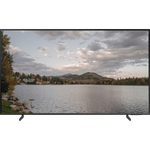
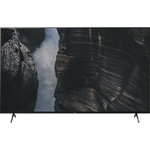
7.8
7.75/10
CONTRAST
7.63/10
7.2/10
COLOR VOLUME SCORE
7.4/10
LED
PANEL TYPE
LED FALD
VA
PANEL SUB-TYPE
VA
The Sony X90J (LCD) and Samsung Q60B (LCD) both have good picture quality, though the Sony X90J (LCD) has somewhat better picture quality.
Movies & TV
6.6


7.9
7.75/10
CONTRAST
7.63/10
8.5/10
BLACK UNIFORMITY
6.4/10
7.5/10
UPSCALING
10.0/10
Yes
HDR10 SUPPORT
Yes
Yes
HDR10+ SUPPORT
No
No
DOLBY VISION SUPPORT
Yes
The Sony X90J (LCD) is good for movies & TV, while the Samsung Q60B (LCD) is only fair.
The Sony X90J is regarded as better for movies and cinematic TV mostly due to its effective local dimming feature which enhances contrast, making dark scenes look better, while the Samsung Q60B lacks this feature, resulting in less impressive contrast and black uniformity. While both TVs have good color accuracy out of the box and similar color volume, the Sony has slightly better gray uniformity, which is important for viewing scenes with large areas of similar color, although both TVs have limited viewing angles.
Sports
6.4


7.1
7.5/10
MOTION PROCESSING
10.0/10
60Hz
REFRESH RATE
120Hz
10.0/10
INPUT LAG SCORE
7.0/10
7.5/10
UPSCALING
10.0/10
8.3/10
SDR BRIGHTNESS SCORE
8.6/10
Yes
HLG SUPPORT
Yes
The Sony X90J (LCD) is good for sports, while the Samsung Q60B (LCD) is only fair.
Gaming
5.6


8.2
5.2/10
RESPONSE TIME SCORE
8.0/10
10.0/10
INPUT LAG SCORE
7.0/10
7.5/10
MOTION PROCESSING
10.0/10
0.0/100
GAMING LOCAL DIMMING
80.0/100
6.9/10
GAME HDR BRIGHTNESS SCORE
8.2/10
The Sony X90J (LCD) is very good for gaming, while the Samsung Q60B (LCD) is poor.
The Sony X90J is better suited for gaming due to its very good response time, allowing for smoother motion rendering, while the Samsung Q60B has a poor response time, leading to greater motion blur. Though the Samsung Q60B has effectively the lowest input lag, making it very responsive to inputs, the Sony X90J has a good input lag score as well, making it responsive enough for most gaming needs.
News, Talk, & Other TV
7.6


8.9
8.3/10
SDR BRIGHTNESS SCORE
8.6/10
7.5/10
UPSCALING
10.0/10
The Sony X90J (LCD) is very good for news, talk, & other TV, while the Samsung Q60B (LCD) is good.
The Sony X90J performs very well for watching news, talk shows, and other TV programs as it has excellent upscaling abilities and very good SDR brightness, ensuring clearer images and good visibility in various lighting conditions. In contrast, the Samsung Q60B, while still good in these areas, is a bit behind in upscaling quality and has a somewhat less impressive color gamut, which could result in marginally less vibrant images.
Bright Room
7.1


7.6
5.3/10
VIEWING ANGLE
5.2/10
8.3/10
SDR BRIGHTNESS SCORE
8.6/10
6.7/10
HDR BRIGHTNESS SCORE
7.9/10
6.3/10
REFLECTIONS SCORE
5.9/10
The Sony X90J (LCD) and Samsung Q60B (LCD) are both good for bright room, though the Sony X90J (LCD) is somewhat better.
The Samsung Q60B and Sony X90J are great options for bright rooms due to their high SDR and HDR brightness, which helps maintain picture clarity even in well-lit environments. Additionally, they both handle reflections well, ensuring the screen remains viewable; however, while the Samsung Q60B excels in reflection handling, the Sony X90J slightly outperforms it in color volume and color gamut, offering richer and more vivid colors.
Cost
$578


$800
$200
$400
$600
$800
$1,000
$1,200
The Samsung Q60B (LCD) has a price of $578 and the Sony X90J (LCD) costs $800.
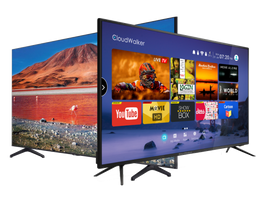
Let Us Help Find Your Perfect TV
Find your new TV
Key similarities
Cartoons & Animation
8.4


8.3
7.2/10
COLOR GAMUT SCORE
7.0/10
7.2/10
COLOR VOLUME SCORE
7.4/10
8.3/10
SDR BRIGHTNESS SCORE
8.6/10
9.1/10
COLORS OUT OF THE BOX SCORE
9.0/10
7.2/10
GRAY UNIFORMITY
6.8/10
The Samsung Q60B (LCD) and Sony X90J (LCD) are both very good for cartoons & animation.
The Samsung Q60B and Sony X90J both excel at displaying cartoons and animation thanks to their excellent color accuracy straight out of the box, meaning the colors look great without needing adjustments. Additionally, both TVs have a good color gamut and color volume, which ensures a wide range of colors are displayed vividly and consistently, important for the vibrant palettes often used in animated content.
Give feedback
We’re constantly working to improve.
How the Samsung Q60B (LCD) and the Sony X90J (LCD) compare to other TVs
Spec Comparison
| Samsung Q60B (LCD) | Sony X90J (LCD) |
GENERAL | |||
|---|---|---|---|
| Price | |||
$578 | $800 | ||
Brand | |||
Brand | Samsung | Sony | |
Release Date | |||
Release Date | April 2, 2022 | April 1, 2021 | |
Full name | |||
Full name | QN50Q60B | XR-50X90J | |
Screen Size | |||
Screen Size | 50" | 50" | |
Screen Resolution | |||
Screen Resolution | 4K | 4K | |
TV FEATURES | |||
|---|---|---|---|
Operating System | |||
Operating System | Tizen | Android TV | |
Sound Quality Score | |||
Sound Quality Score | 5.9/10 | 7.3/10 | |
NextGen Ready | |||
NextGen Ready | No | Yes | |
HDMI Ports | |||
HDMI Ports | 3 | 4 | |
Coax Ports | |||
Coax Ports | 1 | 1 | |
DISPLAY QUALITY SCORES | |||
|---|---|---|---|
Picture Quality Score | |||
Picture Quality Score | 7.3/10 | 7.8/10 | |
Bright Room Score | |||
Bright Room Score | 7.1/10 | 7.7/10 | |
Gaming Score | |||
Gaming Score | 5.6/10 | 8.2/10 | |
Movies & TV Score | |||
Movies & TV Score | 6.7/10 | 7.9/10 | |
Sports Score | |||
Sports Score | 6.5/10 | 7.1/10 | |
PHYSICAL | |||
|---|---|---|---|
Dimensions w/o Stand (H x W x D) | |||
Dimensions w/o Stand (H x W x D) | 25.4" x 44" x 1" | 25.5" x 44" x 2.7" | |
Dimensions with Stand (H x W) | |||
Dimensions with Stand (H x W) | 26.8" x 44" | 28.1" x 44" | |
Weight without Stand | |||
Weight without Stand | 25.4 lbs | 29.8 lbs | |
VESA Mount | |||
VESA Mount | 200 x 200 | 200 x 200 | |
DISPLAY | |||
|---|---|---|---|
Color Depth | |||
Color Depth | 10 bit | 10 bit | |
Black Frame Insertion | |||
Black Frame Insertion | Yes | Yes | |
Auto Low Latency Mode | |||
Auto Low Latency Mode | Yes | Yes | |
Contrast | |||
Contrast | 7.8/10 | 7.6/10 | |
Local Dimming | |||
Local Dimming | 2.5/10 | 8/10 | |
SOUND | |||
|---|---|---|---|
Speaker Setup | |||
Speaker Setup | 2.0 | 2.0 | |
Speaker Power | |||
Speaker Power | 20 W | 20 W | |
Dolby Atmos | |||
Dolby Atmos | Bypass only | Yes | |
DTS:X | |||
DTS:X | No | Up to DTS Digital Surround, Bypass only | |
Shopping
Samsung Q60B (LCD)
See more
Dig into reviews and images
CNET
David Katzmaier | June 2022
"Samsung's 2022 QLED workhorse shines in bright rooms and with HDR. The Samsung Q60B stands out from the slew of entry-level TVs with an ultra-thin frame, a skinny profile from the side and even narrow stand legs. The Q60B is a very good bright-room TV, and my subjective impression of its ample light output was proven by measurements."
Get a great deal on the Samsung Q60B (LCD) or the Sony X90J (LCD)
About Samsung
Samsung, a South Korean electronics manufacturer, holds the title of being the largest global TV vendor in terms of units sold. They offer a diverse lineup of TV products that cater to various budget ranges. A notable achievement in recent years is the development of Quantum Dots, a technology that enhances color reproduction, resulting in richer and more vibrant hues. Samsung TVs are well-regarded for their high manufacturing quality and user-friendly software, making them an excellent choice for consumers seeking an intuitive viewing experience.
About Sony
Sony stands as a highly experienced and widely trusted TV manufacturer, earning a reputation that surpasses all others. A Japanese company, Sony has been making TVs for far longs than it has been making Playstation game consoles. Sony's high-end TVs are often regarded as the ultimate choice for videophiles, representing the epitome of quality, albeit at a premium price point. Renowned for their advanced and precise motion handling, as well as their cutting-edge local dimming algorithms, Sony consistently delivers unparalleled performance in these areas. They include Google TV software with all their TV sets, which grants access to the largest selection of apps available and they also include Bravia Core which is a movie streaming platform specifically for Sony TVs that offers higher picture quality by using more bandwidth.
Give feedback
We're constantly perfecting our model
TV guides you might be interested in
More comparisons for you
FAQs
FAQs about TVs
Why trust us
This information was produced and vetted by the PerfectRec TVs team. We are a product research and recommendation organization that meticulously reviews and evaluates the latest TV information and makes it digestible for you.
By the numbers
385
TVs evaluated
33,110
TVs stats compiled
21
Proprietary TVs ratings developed
132,330
Recommendations made
19,850
Consumer hours saved
About the TV team
Joe Golden, Ph.D
CEO and TVs Editor
Joe is an entrepreneur and lifelong electronics enthusiast with a Ph.D in Economics from the University of Michigan.
Jason Lew
Staff Expert & Software Engineer
Jason is a staff expert and software engineer that has been making laptop recommendations for 7 years and moderates one of the largest laptop subreddits.
Chandradeep Chowdhury
Staff Expert & Software Engineer
Chandradeep is a staff expert and software engineer and expert in televisions and monitors. He’s been making monitor recommendations for ten years.
Jaime Roldán
TVs Expert
Jaime is a Colombia-based TV expert. He is an electronics engineer with 8 years of experience in the telecom sector and has been making TV recommendations for 12 years.
